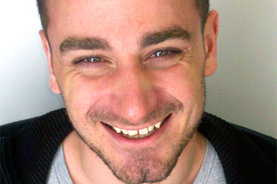My name is Aaron Stella. I’m 25 years old and HIV-positive — or poz, in the vernacular. Welcome, everyone, to a new column about HIV in Philadelphia. There’s a lot we have to talk about.
On the day of my diagnosis last summer, I left the Mazzoni offices at Ninth and Locust streets and walked to South Philadelphia. Everything I laid eyes on seemed wrapped in hard iron. My mind was blank and my heart, stony and dormant.
Later that day, my friend and I bought fish from the Italian Market. When we got home, we found the fish was rotten — and a horde of flies was buzzing about the backyard. There, in the midst of everything seeming diseased and derelict, I said to him, “This HIV. It’s just another living organism trying to live out its life. It’s selfish of me to feel sad, isn’t it?”
In response, he said, “You can be a Daoist in a couple of weeks. For now, be human.”
And with great strength and boldness, that’s how I’ve lived ever since.
Just to be clear, this is not a column about my life as a poz gay white male in Philadelphia. You’ll get my thoughts when needed and exploits when appropriate, but mainly, this is column about HIV: what it is, what people are doing about it and how people perceive it, talk about it or not talk about it; how poz Philadelphians of all walks, races and religions live with it; and how HIV’s evolution defines the ethos of a new generation.
When the first wave of HIV hit the nation 30 years ago, more than 4,000 Philadelphia gay men died in its wake. Many people lost 20 or more friends. Being gay gained a new facet to its stigma. Since most STIs at the time were curable, until HIV appeared, condoms were virtually nonexistent in the gay community. And HIV medication, when it came, wasn’t covered under any health-care plan and often proved ineffective, costing upward of $7,000 a year. Suffice to say, contracting HIV — or Gay-Related Immune Deficiency, as it was called — was a death sentence.
Nowadays, new, effective medications (offered free through many programs in Philadelphia) have paved the way for normalizing the virus and those infected. We in Philly are fortunate to have organizations such as ACT-UP, Mazzoni Center, BEBASHI, the William Way LGBT Community Center, UPenn and many other sedulous supporters combating all things negative (no pun intended) about HIV. Yet, while the fear of death is no longer the central repulsion to HIV, its stigma has become the new death sentence.
I am of a generation coming into our own after the HIV scare, so it means something completely different to my peers and me. While many of us know that life doesn’t end with becoming HIV-poz, we believe it portends a long life as a fallen angel in the shadow of HIV-neg elites. In other words, once you’re poz, you’ll always be undesirable and destined to be unloved.
My generation has a difficult time talking fluently about HIV, and many have no stock in it. Unfortunately, this brand of insouciance not only perpetuates HIV’s stigma, but its infection as well. I can’t count how many people I’ve met (through various venues) who don’t care what disease they have or to whom they pass it, much less know when they were last — if ever — tested.
In their eyes, the battle has been won. With death no longer an imminent factor, they can continue to live out their sexual lives in the shadows even if they contract the virus. And that’s where they believe HIV-poz people dwell — in the shadows. And in reality, many poz folk believe this too.
So where do we go from here? I haven’t even begun to explore the uncharted territory of Philadelphia’s poz community — how it spans every societal group and subculture imaginable. I can’t do this alone, quite simply, because I’m not alone. What I can do is walk with you, one step at a time, just as my friend walked with me on the day of my diagnosis.
Some of you may wonder why I haven’t addressed “the cure.” In lieu of a physical cure — which may come one day — I believe our community has the power to produce one better. Our “cure” will be a greater understanding and support system hailed in by a new dialogue about HIV in Philadelphia — giving voice to those who can only whisper, questing up from under-dark into a new light.
Aaron Stella is editor-in-chief of Phillybroadcaster (www.phillybroadcaster.com), an all-inclusive A&E city blog site in Philadelphia. Since graduating from Temple University with a bachelor’s in English, he has written for several publications in the city, and now devotes his life to tackling the new challenges of HIV in the 21st century.

